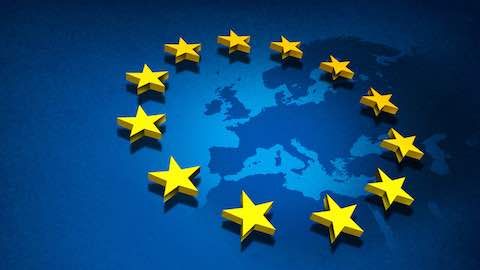- MENU
- HOME
- SEARCH
- WORLD
- MAIN
- AFRICA
- ASIA
- BALKANS
- EUROPE
- LATIN AMERICA
- MIDDLE EAST
- United Kingdom
- United States
- Argentina
- Australia
- Austria
- Benelux
- Brazil
- Canada
- China
- France
- Germany
- Greece
- Hungary
- India
- Indonesia
- Ireland
- Israel
- Italy
- Japan
- Korea
- Mexico
- New Zealand
- Pakistan
- Philippines
- Poland
- Russia
- South Africa
- Spain
- Taiwan
- Turkey
- USA
- BUSINESS
- WEALTH
- STOCKS
- TECH
- HEALTH
- LIFESTYLE
- ENTERTAINMENT
- SPORTS
- RSS
- iHaveNet.com: Ireland Current Events
Countries
Argentina | Australia | Austria | Benelux | Brazil | Canada | China | France | Germany | Greece | Hungary | India | Indonesia | Ireland | Israel | Italy | Japan | Korea | Mexico | New Zealand | Pakistan | Philippines | Poland | Russia | South Africa | Spain | Taiwan | Turkey | United Kingdom | United States
-
When the proposal was initially made for a common European currency, it seemed to be a good idea. Although inexpert in economics, it struck me as an effect of a false analogy with the United States that was common in Europe at that time
-
The European Union has voiced concern about low fertility as a major demographic challenge. If it stays at these low levels, the population quickly moves from growth to decline, which is already happening in Germany, despite immigration
-
The euro crisis is now threatening to turn the European Union into something fundamentally different. The member countries are divided into two classes -- creditors and debtors -- with the creditors in charge
-
Like ghosts from the past, we see political violence, xenophobia, migrants being scapegoated and extreme nationalism creeping into our public debates -- even into our parliaments. This is a Europe diverging from its founding principles
-
The Nobel Committee recently awarded its prestigious top prize to 500 million people who have, for the last 65 years, made a conscious decision to live together in peace and harmony: the European Union
-
Seventeen economically disparate nations bound their fortunes together in creating the euro zone, and it is exactly this that has thrown the European project into crisis
-
2012 could be the make-or-break moment for the embattled eurozone. Europe could either continue on the path of ever-greater integration - or return to being a regional group of rival states.
-
The euro should now be recognized as an experiment that failed. The political goal of creating a harmonious Europe has also failed
-
At the heart of this particular crisis is the unpleasant fact that the common European currency project is, in its present form, simply not working
-
The stage is set for the 2012 Euro Cup following Friday's draw that saw host Poland and Ukraine getting the top draws while Spain placed in a tougher group. Poland was drawn in Group A along with Greece, Russia, and Czech Republic
-
What made Europe a compelling political, economic, and social alternative wedged between Anglo-American free marketeers and Soviet nomenklatura is rapidly becoming a thing of the past
-
We may be looking at the possibility of a worldwide financial meltdown
-
If you want the real reason for concern in the United States about what's happening in Europe, follow the money. A Greek (or Irish or Spanish or Italian or Portuguese) default would have roughly the same effect on our financial system as the implosion of Lehman Brothers in 2008. That is, financial chaos
-
Europe faces a banking crisis it has not wanted to admit even exists
-
The plans all are financial solutions to a particular set of financial problems. But regardless of whether they are realistic in addressing the financial problem, the question of whether the financial issue really addresses the fundamental dilemma of Europe -- which is political and geopolitical -- remains
-
A visit to the Emerald Isle is not complete without including Northern Ireland. It offers the tourist a very different but still very Irish world.
-
The Irish seem born with a love of music. That love is especially strong for traditional Irish music. You can hear it at cultural heritage centers and concert halls, but it sounds best in a pub. Live music is a weekly -- and sometimes nightly -- draw at many town pubs worth their salt. Trad music is especially popular in Dingle, Doolin, Galway, and Dublin.
-
Ireland's International Monetary Fund / European Union programme is built upon three key pillars: a restructuring of the banking sector, a restoration of competitiveness, and fiscal consolidation. In reality, success on the second and third pillar is likely to prove insufficient unless the first is addressed in a sustainable manner
-
The United States might be grappling with a host of serious economic maladies, but comparatively speaking, we're still better equipped to continue growing than many other advanced economies, experts say. Here's a list of five advanced economies that face economic challenges more serious than our own
-
The European Union is in danger of compounding its ongoing economic crisis with a political crisis of its own making. Over the last year, crises of confidence have hit the 17 EU members that in the years since 1998 have given up their own currencies to adopt the euro. Markets behaved as though the debt of peripheral EU countries was as safe as that of core EU countries
-
EU leaders announced a new plan to contain the debt crisis in the euro area, after private banks and investors agreed to write off 50% of Greek debt from their books
-
It was short-term good news in that it defused 'the bomb' -- the possible catastrophe vortex of failing banks and defaulting sovereigns. The bad news is that it will induce a recession. Banks will create a credit crunch in trying to meet capital adequacy ratios, and the new austerity will create a fiscal contraction
-
The crisis won't be over until the underlying flaw of the euro is fixed -- namely the separation of monetary and fiscal policy. German public opinion has to realise that the euro was built on imperfect foundations and that these imperfections must be corrected. Meanwhile, the Italian president of the ECB will need all his technical and political expertise to keep the Eurozone together
-
The European Union is presently a source of great instability that leaders have yet to tackle. This column argues the current policy response is misguided. The adjustment programmes are bound to fail to achieve sustainable budget deficits, and may result in an unprecedented destruction of economic activity
-
Despite federal spending consuming 27.2 percent of GDP, the United States maintains a Aaa rating. But you can't say the same about Ireland and many other countries in both the developed and developing world where continued fallout from the economic crisis is hurting their credit ratings. As a result, investors have viewed the economic situations in these countries as increasingly risky bets.
-
Ireland fell back into recession during the last quarter of 2011, according to data from the Central Statistics Office
-
Ireland's economic dependence on external partners means its fate is largely out of its hands
-
Over the past two years, the eurozone members have done a remarkable job managing the short-term symptoms of the crisis, although the costs have been great. Yet the long-term challenge remains
-
Everyone is wondering about the next disaster to befall Europe. Italy is one focus; Spain is also a possibility. But these crises are already under way. Instead, the next crisis will be political, not in the sense of what conventional politician is going to become prime minister, but in the deeper sense of whether Europe's political elite can retain power
-
With no end in sight for the two-year-old euro crisis, the question now is can the EU survive it while remaining united?
-
Europe's new fiscal compact treaty attempts to force regional reform without challenging sovereignty
-
From the summer Olympics to the 100th anniversary of the Titanic's sinking, several major events will make the British Isles a popular destination in 2012
-
Even before the financial sector and sovereign debt crisis began to destabilise Europe's banking system, European leaders were voicing fears that the Old World might be slipping towards global irrelevance
-
Martin McGuiness, now running for the presidency in the Republic of Ireland, is an admitted former member of the IRA
-
Conventional wisdom has it that the eurozone cannot have a monetary union without also having a fiscal union. Euro-enthusiasts see the single currency as the first steppingstone toward a broader economic union, which is their dream. Euroskeptics do, too, but they see that endgame as hell -- and would prefer the single currency to be dismantled
-
France, like all of Europe, is caught in an economic tsunami, and France is teetering at the edge of the precipice. Every week, it seems, presidents and prime ministers hold urgent meetings searching for a solution, culminating with the G-20 convocation recently. Still, the problem grows only worse
-
European Union leaders have brokered a deal to reduce Greece's debt and hopefully stem the continent's lingering debt crisis. The deal is a major move forward, but it is still only one step in restoring stability on a continent beset by economic woes
-
Europe was seen as a work in progress moving inevitably toward unification -- a group of nations committed to a common fate. What was a core vision in 2008 is now gone. What was inconceivable -- the primacy of the traditional nation-state -- is now commonly discussed, and steps to devolve Europe in part or in whole are being contemplated. This is not a trivial event
-
A new round of second-quarter GDP figures shows slowing growth in the EU, which makes for a complicated economic situation, as reduced government spending can further stifle growth. Some economists say that, in tackling this dilemma, European governments are focusing too closely on their balance sheets and neglecting to propose real growth policies
© iHaveNet.com




